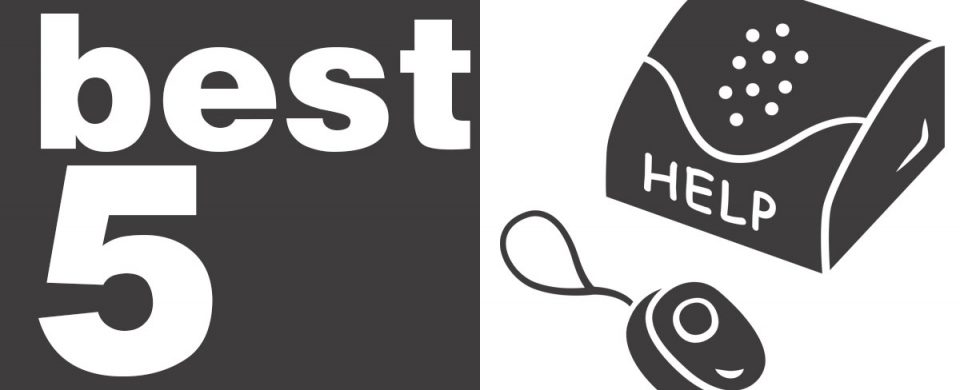
5 Best Medical Alert Systems in Saskatchewan for Seniors
As we grow older, we become less confident in our strength and ability to care for ourselves. We start to wonder how we can call for help if we have a medical emergency if we can’t get to a phone. At the same time, we don’t want to be a burden to family members and want to try to remain independent for as long as possible.
The good news is that seniors in Saskatchewan can now live independently and without fear because of advanced medical alert systems. Equipped with state-of-the-art technology including fall detection, these security devices give access to emergency services 24/7.
With a simple push of the emergency panic button, the user gets connected to a monitoring center to ask for help.
If you are interested in getting a medical alert system for you or a loved one, fill out a short form on this page to receive free and no-obligation quotes!
Types of Medical alert systems for seniors: How do they work?
To know whether a medical alert system will benefit you or an elderly relative, it is important to understand how they work.
Medical alert systems fall under 2 categories: monitored and non-monitored.
Non-monitored medical alert systems are standard wearable devices (necklace or bracelet) that has a panic button which sends an alert to a designated contact (relative or friend) when the button is pushed.
Monitored medical alert systems, on the other hand, also come with pendant or bracelet panic buttons that connect to a professional monitoring center when the emergency button is pushed.
The primary differences you will find between these 2 types of systems are:
- Price
- Receiver of the emergency alert and the speed of response
- Safety Features of the system
Non-monitored medical alert systems have no monthly fees; you just need to buy the equipment. However, a designated contact must be responsible for receiving the alerts and reacting to them fast. It is necessary for the user to push the panic button to send an alert and the device does not have fall detection.
With monitored systems, the user pays monthly fees for the monitoring service. The emergency alerts are received by a monitoring center which is available 24/7 with trained agents who respond quickly to any emergency. These systems offer fall detection as well as a host of other safety features, including GPS tracking and geo-fencing.
When searching for the right medical alert system, you need to decide whether you want a monitored or non-monitored device. Your choice must take into account the availability of a family member or friend to receive and react to alerts, your budget, your health condition, and your needs.
Landline or Cellular: Which type of system works for you?
Monitored and non-monitored medical alert systems are also available with landline or cellular systems. Landline-based medical alert systems usually cost less than cellular types.
A medical alert system hooked up to a landline will provide the user with protection within the home or up to the yard, depending on the system’s range from the console. If you need the device to work when you are outside the home, you can also consider getting a cellular or mobile medical alert system.
Although mobile systems generally cost more, they offer additional safety features such as GPS tracking. They can also be used when you go on vacation anywhere in Canada.
How to use a medical alert system with monitoring in an emergency
A medical alert system, also called a Personal Emergency Response System (PERS), has a base unit and a wearable device (either as a necklace or wristband) which has a panic button. This device must be worn at all times so that the user can use the emergency button at any time, even when in bed or in the bathroom.
When the user pushes the emergency button, an alert is triggered and sent to a monitoring center. The 2-way voice communication system is also activated. The user will hear a voice (a trained agent) on the other end who will be checking the status of the user. If the user is unable to speak, the monitoring agent will make an assessment of the situation and dispatch emergency services.
If the system has fall detection capabilities, a fall alert is automatically sent to the monitoring center if the user suffers from a fall. With this feature, a user is guaranteed emergency assistance even if he fails to push the button because he is unconscious after a fall.
Standard medical alert systems require the user to push the emergency button for assistance.
Do you need fall detection?
Fall detection is an important safety feature for seniors who have a history of falls or a fear of falling. Some medical conditions also put individuals at high risk for falls – stroke, heart attack, vertigo, poor eyesight, walking difficulties or balance issues, etc.
Statistics Canada reports that 1 out of 3 Canadians aged 65 and above suffer a fall every year. Many of these seniors land in hospital emergency rooms with broken bones and head injuries.
If a user falls, sensors send a fall alert automatically to the monitoring center. Special algorithms are used, including the speed, height, and position, to differentiate a fall from a normal or routine movement. Once a fall alert is received, the monitoring center will try to speak to the user to verify his or her condition. Emergency services is dispatched as quickly as possible and when necessary.
Fall detection technology is not infallible. For instance, if a user drops his pendant, the system may send a fall alert. However, the alert can be cancelled by pushing the button again or informing the monitoring center through the voice system that it is not an emergency. Very little harm is done but the assurance that someone is always looking out for you is invaluable.
It is critical that a senior who has fallen receive immediate medical assistance to increase chances of recovery and avoid risky complications which could lead to long-term care.
If you have a history of falls, have a fear of falling, or at a high risk for falls, consider adding fall detection to your medical alert system. For just a little more, you can enjoy an extra layer of protection with fall detection.
Protect your loved one with medical alert systems
More and more Canadians prefer to live in their own homes during their retirement and even as they enter the twilight years. Medical conditions that pose risks to seniors, especially those who live alone, can make independence difficult. Who will be around to help in an emergency?
Today, this question is no longer a problem, thanks to advanced medical alert systems.
Medical alert systems offer the following important features to protect seniors during an emergency:
- Fall detection
- 24/7 access to an emergency button to ask for help
- Non-stop monitoring services from a qualified monitoring center
- 2-way voice communication
- Medication reminder or dispenser
- GPS location tracking
- Geo-fencing
- Family notification in case of an emergency
- Caregiver access to the status and history of the user by logging into a portal
Medical alert systems provide PEACE OF MIND to seniors and their loved ones. They also provide INDEPENDENCE and COMFORT. For just a small price, seniors can continue to live alone where they choose without worrying who to call for help in an emergency
With just one push of a button, seniors can get emergency services for any type of emergency.
How to choose a medical alert system
Once you are ready to shop for a good medical alert system for your needs, you have 3 essential decisions to make that will affect the reliability of your system and the price.
- Do you want a landline-based or cellular system?
If you don’t have a landline, you will need a cellular system which costs more. However, cellular or mobile systems can protect seniors even when they are outside the home.
- Do you want a monitored or non-monitored system?
Monitored systems have monthly fees. On the other hand, non-monitored systems require a caregiver to monitor the system and respond to emergency alerts from the user. Monitored systems offer higher reliability and peace of mind and convenience for the user as well as family members.
- Do you need fall detection?
Fall detection is an option that can be added to a medical alert system for an additional fee. Consider if you require fall detection with your monthly plan. Keep in mind that systems without fall detection require the user to push the emergency button after a fall to receive emergency assistance.
When you have determined your needs from answers to the above questions, you can start shopping for the right medical alert system for you. Below are the top 5 medical alert systems available in Saskatchewan to choose from.
The Top 5 Medical Alert Systems in Saskatchewan for the Elderly
Compare and choose from these top 5 medical alert systems for the elderly in Saskatchewan. Improve the quality of life of a loved one and give the gift of independence and peace of mind with these advanced systems for their safety and security.
Philips Lifeline |
|
Philip’s Lifeline is a medical alert system for seniors who want independence without worrying about their safety. The emergency panic button found in a pendant gives access to emergency assistance 24/7. The system allows the user to call for help at any time, even if he can’t speak. With just one press of a button, trained professionals will summon help fast. Lifeline also offers fall detection. If the user falls, an alert is sent automatically to the monitoring center who will dispatch emergency services. The system is available home or mobile protection. Other options include GPS location tracking and medication dispensers. HomeSafe costs $29.95; HomeSafe Cell costs $41.95; GoSafe costs $44.95, and $56.95 for AutoAlert. They charge an activation fee of $50.00.
|
SecurTEK Medical Alert |
|
This personal emergency response system can be worn or mounted and has 24/7 monitoring. It also has 2-way voice communication and fall detection. It is a good option for seniors who live alone or need the assurance of emergency services at any time. The company is a subsidiary of SaskTel and offers convenient and affordable medical alert solutions to residents of Saskatchewan. It has a network of dealers throughout the province. The system can inform loved ones of the user’s activities and unusual movement such as wandering. Their medical alert is available for $29.95 monthly which includes the waterproof pendant worn around the wrist or neck.
|
Global Security |
|
Global Security is a top-notch security company in Canada which offers residential security and wellness solutions. Its medical alert system allows seniors and persons with disabilities to live independently without worries. The medical alert system can be included in a home security system for total safety and protection. Water-resistant panic buttons are worn as a necklace or wristband. Their systems offer fall detection as well as GPS tracking. The user can easily talk directly into the button and listen to the responding agent. Family members can also be contacted for help, if needed. As a leading ambassador of ADT in Canada, this company can provide reliable monitoring services from its certified monitoring centers in Canada and the USA.
|
Life Assure |
|
This medical alert system is backed by a lifetime warranty and provides access to emergency services, day and night. Seniors don’t have to worry about getting help because their emergency button is always accessible to get quick medical assistance. The system has a range of 600 feet from the console and has 2-way voice communication. If a senior feels weak, faint, or has an injury or accident, one push of the button will connect to the monitoring center who will summon help. The simplest package costs $29.99 a month (Standard) while the Mobile Plus costs $69.95 with GPS and Fall Detection.
|
Direct Alert |
|
Direct Alert is a medical alert system that is available throughout Canada. It has more than 15 years of experience in the industry and is 100% Canadian- owned and operated. No long-term contract is required and customers have a 30-day money-back guarantee. Their products can be connected to all types of phone systems – landline, cellular, VOIP and cable. Their systems include a panic button pendants or bracelet with 2-way voice communication. Monthly fees start at $25 a month for home protection plans and wireless services. |
Our reliable partners offer superior medical alert systems anywhere you are in Saskatchewan:
- Regina
- Saskatoon
- Prince Albert
- Moose Jaw
- Lloydminster
- Swift Current
- And many more!
Consider the medical alert systems presented above and compare prices, features, and requirements.
The best way to compare them is to get FREE and NO OBLIGATION quotes. Fill out the form below to start searching for the right medical alert system for you!
Our partners are reputable, licensed, and insured companies that specialize in medical alert systems for seniors.
Behind the scene: What makes monitoring services worth paying for seniors?
Every day, trained response agents working in certified monitoring centers across Canada take thousands of calls from seniors and persons with disabilities who need emergency assistance.
Working round-the-clock, these professionals have received the necessary emergency training to understand the nature of emergencies that happen to people and how to determine the level of response required so appropriate help can be dispatched without delay.
These professionals are caring individuals with strong communication skills and empathy for seniors and persons with medical conditions. Because of their special qualities, they can provide the right “human” touch that can quickly reassure a senior in distress.
On top of the special people who operate monitoring centers to which medical alert systems are connected, these emergency response centers are also equipped with state-of-the-art technology that allows them to know important customer information such as address, age, health conditions, family to contact, and other relevant data as soon as an emergency alert comes in.
And because Canada is multi-cultural, many of these professionals speak English, French, and other major languages to better assist customers in need.
Technology and people work hand in hand to provide thousands of people in Saskatchewan and across Canada with reliable emergency services 24 hours, 7 days a week. For this reason, fees you pay for monitoring services are well worth it as you get in return PEACE OF MIND and SECURITY for your well-being.
Worried about how to get help when you are alone at home in a medical emergency? Thanks to medical alert systems with monitoring services, seniors never have to worry about getting help quickly if they fall, feel sick, or have an accident.
Choose a medical alert system backed by reliable security companies who are members of the Canadian Security Association (CANASA).
Frequently Asked Questions about Medical Alert Systems
It is common to have questions when shopping for a good medical alert system for you. Below are frequently asked questions about medical alert systems that can help you make the right choice for your safety.
Who needs to wear a medical alert system?
Medical alert systems are recommended for anyone who needs peace of mind that they can get assistance in case of a medical emergency, accident, fire, break-in, etc. It is ideal for seniors who live alone and could suffer a fall at home. People with disabilities can also be protected by a medical alert system.
What must I look for in a medical alert system for seniors?
You should look for a medical alert system provided by a company with a good reputation and track record. The system must be easy-to-install and maintain and connected to a UL-certified monitoring center. The panic button must be waterproof or water-resistant, should have a battery back-up, and clear 2-way voice communication. Look for a medical alert system with valuable safety features for seniors such as fall detection and GPS location tracking. Lastly, a medical alert system must be within your budget so you can make monthly payments for monitoring services.
What type of medical alert systems are available?
There are various types of medical alert systems available to suit a user’s lifestyle and needs. The systems can be connected to a landline for protection at home or to cellular networks for mobile protection. They can offer standard protection with an emergency panic button or include more advanced features such as automatic fall detection and GPS tracking.
What type of help do monitoring centers provide in an emergency?
The level of response is tailored to the emergency situation at hand. If it is a critical medical emergency such as a fall, injury, stroke, or heart attack, medical responders will be dispatched to the location. If it is a suspected break-in, police will be summoned. If it is not an emergency situation but the user requires assistance, a designated contact can be contacted (as provided in the customer’s plan) to go to the home to assist.
How much do medical alert systems cost?
Prices vary from one company to another and the fees depend on the type of plan selected. Standard or basic plans with an emergency panic button worn as a necklace or watch start from $25 and up. More advanced systems such as wireless systems with GPS or fall detection can cost $35 or more monthly in monitoring fees. You can compare prices by getting free quotes using a short online form on this page.
What happens if the panic button is accidentally pressed?
False alerts can happen such as when the button is accidentally pressed. It won’t be a problem because the user can immediately cancel the alert by pressing the button again or speaking to the monitoring center through the 2-way voice system.
Are medical alert systems covered by health insurance?
Most insurance providers don’t cover medical alert systems but it is better to check with your own insurer.
What happens to a medical alert system during a power outage?
Landline systems have back-up batteries and as long as the telephone line remains functional, the medical alert system will work. Cellular systems are connected to a cellular network and if the service is interrupted, the medical alert system will not be active.
Are fall detectors 100% reliable?
No fall detection system is 100% accurate. While it can detect most falls, a user must press the emergency button if an alert is not triggered after a fall.
Can I buy a medical alert system for my parent and have it billed to me?
Yes, special arrangements such as this are offered by many providers.
Can two people use a medical alert system in the same location?
Yes, two people living in the same address can be covered by the same medical alert system. There will be a one-time charge for the additional emergency button.
Who should choose a mobile medical alert system?
Mobile medical alert systems are recommended for older adults who spend time outside the home. This type of system works with a cellular network and can be used virtually anywhere. The user can press the emergency button to ask for assistance in an emergency even when outside the home. This makes mobile systems ideal for seniors who like to go shopping alone, hiking, driving, and other outdoor activities.
Save Money by Comparing Free Quotes for Medical Alert Systems
You can save money when you buy a medical alert system by comparing free quotes from reliable partners in our network. Our partners have successfully built a reputation in the security industry and offer superior technologies in the field of medical and personal emergency response systems.
By filling out the form below, you will receive FREE and NO OBLIGATION offers for the best medical alert systems in Saskatchewan. Because no two individuals are the same, we will send your request to our partners so they can provide you with a quote that is tailored to your situation.
Consider the price, quality of equipment, safety features, and reliability of the company when choosing your medical alert system. Don’t forget to think about the intended user’s needs, especially the health condition, when making your choice. For instance, frail individuals with a high-risk of falls would benefit most from a medical alert system with fall detection.
Don’t waste time and money comparing different sites or calling companies for information on their products. Fill out the form below and take advantage of FREE QUOTES for top medical alert systems for seniors.
Comments are closed.

Copyright© 2024 Compare Home Quotes.
Oolong Media






